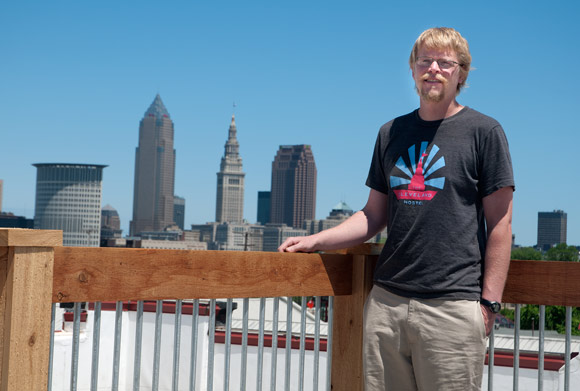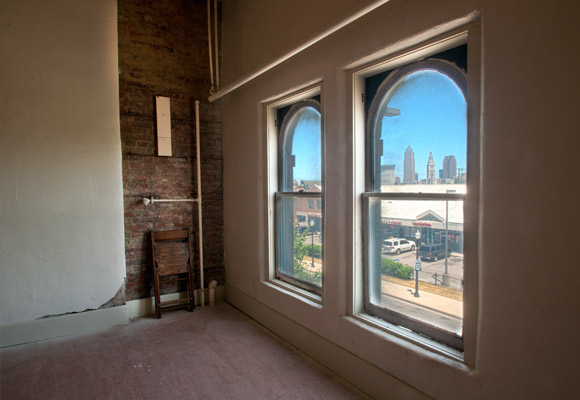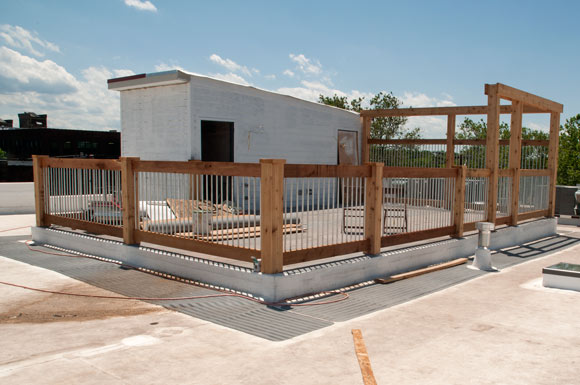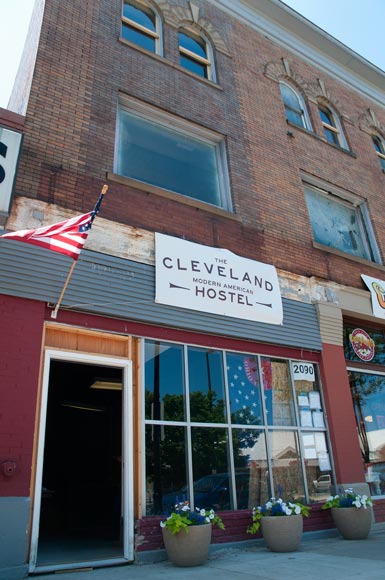modern hostel to cater to travelers who aim to experience cleveland rather than simply visit it
As the West Side Market prepares to celebrate its 100th birthday, a brand new entity is sprouting just one block south of the venerable food hall. The Cleveland Hostel, which is scheduled to open later this month, will be the area's only modern hostel catering to travelers who aim to experience American cities rather than simply visit them.
The hostel, which is currently taking shape in the space adjacent to Campbell's Sweets Factory, will boast 60 beds, a fully equipped kitchen, bike rental and a spectacular rooftop patio. Prices per night start as low as $20. The project's founder, Mark Raymond, will act as proprietor and full-time resident.
With a master's degree in urban planning, Raymond has traveled and hostelled for more than 10 years, visiting some 70 countries. In 2010, after a stint working at a ski resort in Alta, Utah, Raymond returned to Cleveland with his idea. The hostel will ironically -- and, perhaps, poetically -- connect Raymond's passion for wanderlust with his hometown, thus enabling him to showcase Cleveland via a unique, affordable venue.
"You can invite people to your city and show them where you live," says Raymond. "You can share your experiences." He cites the inherent appeal of the Ohio City location, with easy access to the West Side Market, public transportation, and the area's bustling restaurant and entertainment scene.
Jim Hamilton, former president of the now-defunct Northeast Ohio Council of Hostelling International and seasoned stateside hostel traveler, agrees that Raymond's location is ideal. But he also touts the aspect of hostel travel that blooms inside the facility.
"You could travel and stay in hotels and eat in restaurants and never exchange any kind of meaningful conversation except placing orders and that sort of thing," says Hamilton. "If you go to a hostel, people sit in the common room. You can strike up conversations. You get to meet people from all over the world."
With a handful of undeniable tethers to Cleveland's past and untold connections yet to be made with visitors from across the globe, this promising venture thrums with good karma, starting with the building at 2084 W. 25th Street.
The hostel may be brand new, but it is housed in a structure that is more than 100 years old. And while this is Raymond's first for-profit venture, his family's building supply company has been a fixture in Northeast Ohio since 1947. Lastly, when the 30-year-old entrepreneur moves into his residential apartment on the hostel's third floor, he'll be just a few short blocks from where his grandfather was born on Train Avenue in 1916. The move evokes a certain nostalgia for the Geneva native.
"We'd come downtown for events or at Christmas time," says Raymond, recalling family visits to the Twigbee shop, rides on the rapid, and viewing holiday lighting displays. "I always loved that so much. And now I get to look out my window and see the Terminal Tower," he adds, showing off the view from his new digs.
While hostels have been a European staple for decades, and cities like San Francisco and New York have well-established hostelling communities, the trend is just taking off in Ohio and neighboring states. The Ohio City lodgings will no doubt be a welcome addition to the growing regional network and an ideal pin point on the connect-the-dots-diagram for hostel fans traveling throughout the Great Lakes.
"The typical route for a European traveler is to hit New York, then go across New York State via Buffalo and Niagara Falls," explains Hamilton. "Then they swing down and go to Chicago. Cleveland is right on that path and [Raymond] should pick up a good deal of that traffic."
Hamilton should know. He juggled a variety of tasks at Stanford Hostel from when it opened in the Cuyahoga Valley National Park in 1986 until it went dark in 2008. Although the facility has gone the way of a bed and breakfast, Hamilton revels in a little bit of the historic hostel living on -- and not just in an ideological sense. He and other members of the Council had endeavored to open a downtown Cleveland hostel, but never achieved that goal.
"Stanford was in the park and hard to get to; you had to have a car to get there," says Hamilton of the Peninsula operation. "We had always wanted to open a second hostel in Cleveland, but just keeping up with one consumed all of our time."
When Stanford closed, the group stored beds, furniture, and appliances in hopes of finding a home for them one day.
"Now it’s going to be at his place," says Hamilton, referring to the Cleveland Hostel. Thus forges yet another historical tether, this one between the past (and pastoral) Stanford Hostel and its funkier urban kin.
"The legacy will live on," says Hamilton.
While Raymond is focused on opening his doors to travelers, his vision goes well beyond that. Integrating the hostel with the community via local organizations tops his priority list. Raymond hopes to partner with Spaces Gallery by hosting visiting artists who might return the favor by decorating a room. He's also starting a program with community development advocate Neighborhood Progress that will bring volunteers in from across the country to work at area urban farms and lodge at the hostel.
"We're not just bringing in travelers," says Raymond. "We're getting a little deeper. We're adding another layer."
Photos Bob Perkoski





